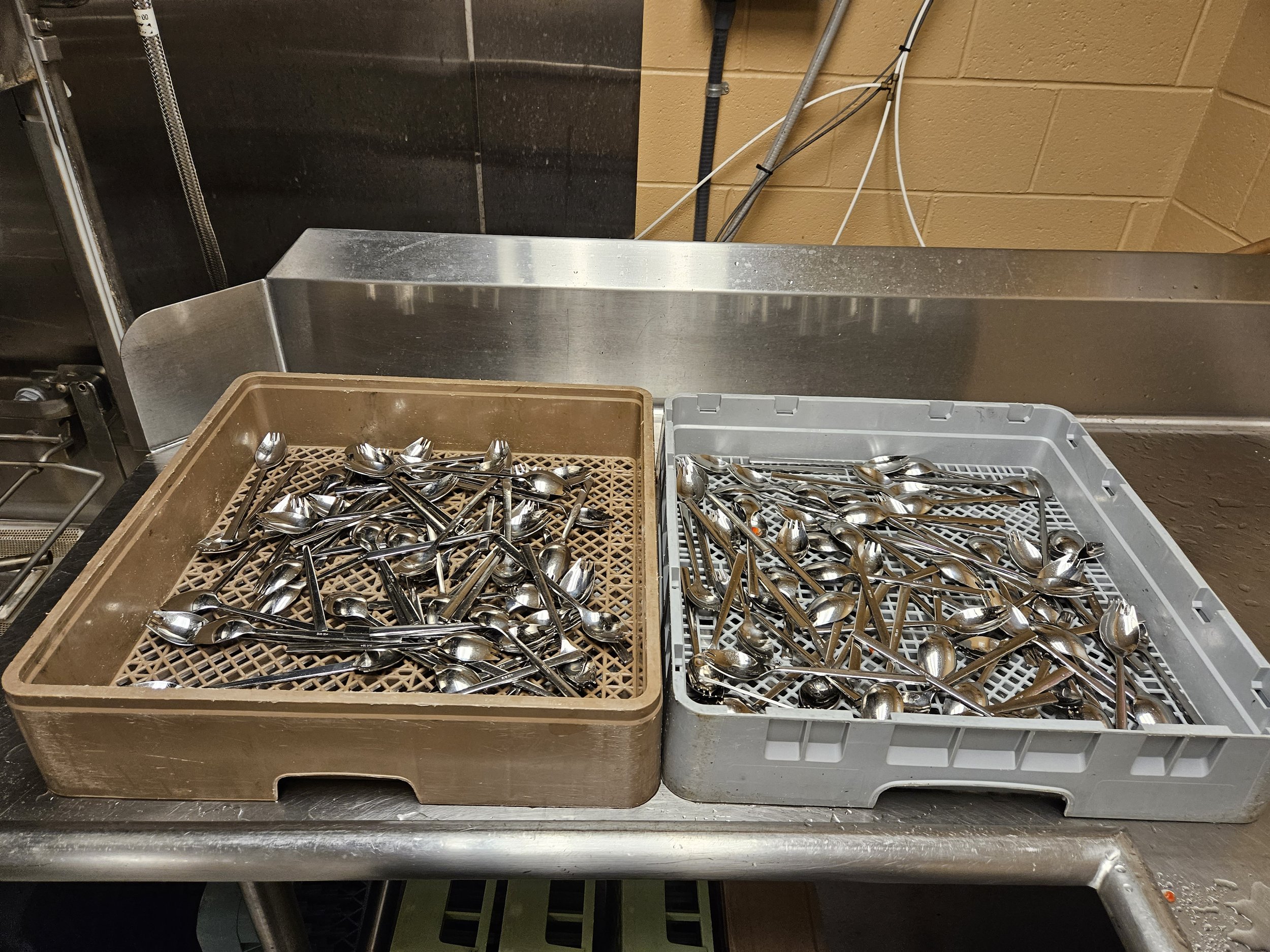Since its founding in 2014, Reaching All Minds (RAM) Academy in Durham has focused on sustainability–fostering among its students a sense of responsibility to their environment and community, locally and globally, now and into the future.
Last year, the school took a major step forward in fulfilling its mission by making a big change in its operations. In a partnership with Don’t Waste Durham (DWD), RAM Academy began using durable, reusable stainless steel trays and sporks in its cafeteria operations, in place of disposable serveware. Each day, after meals are served to the school’s 400 students, DWD staff pick up the trays and sporks and return them to the group’s wash facility, where the items are washed, sanitized, dried, and packed up for return to the school for the next day’s meals.
The operation was launched in October 2022. One year later, school officials and staff view the change from single-use serveware to reusables as a big success.
“We’re pleased with this system on several levels,” says Natasha Wayne, RAM Academy’s director of operations and community engagement. Not least among the benefits is the economic return on the investment. An initial expenditure on the stainless-steel trays and sporks is being offset by savings in supplies purchased, waste generated, and other ways. “We’ll reach break-even in November 2023,” Wayne reports.
From disposables to compostables to reusables
RAM Academy had used Styrofoam trays until 2019, when it switched to compostable serveware. Although that switch was a step closer to fulfilling the school’s commitment to sustainability, it presented operational and economic challenges of its own. Notably, compostable serveware is expensive, and the school was purchasing over 2,000 units every week, according to Wayne.
The timing of the switch to reusables was something of an accident, she recalls. Attending an event sponsored by Leadership Triangle in the spring of 2022, she was inspired by a presentation on reusables by Crystal Dreisbach, Don’t Waste Durham’s founder. An initial conversation solidified the organizations’ mission alignment and was followed by meetings to review potential serveware, costs, and the operational changes that would need to take place. Those discussions led to the launch of the reusables program at the school in October 2022.
Multiple teaching moments — and opportunities
The adoption of the new system predictably presented some challenges. In operations, “the biggest challenge involved those teaching moments with students,” says Mary Smith, RAM Academy’s operations manager. Still, the adjustment for the operations team was not overwhelming. On the upside, school staff are not responsible for washing the trays and sporks; Don’t Waste Durham handles all the pickup, washing, and delivery–an undertaking the school is simply not outfitted for.
Washed and sanitized trays and sporks.
In addition, the volume of waste generated is down substantially–from two full trash bins to one per week. And with composting now limited to food waste, the number of composting bins required has been reduced from eight to three.
RAM Academy has seen other economic benefits from the switch. In addition to saving on packaging, they have also realized saved costs that weren’t anticipated during the initial budget evaluations. For example, compostable trays are less sturdy, and their use resulted in a certain amount of food spillage each day. “That adds up,” says Wayne.
Lessons in responsibility and care
Teaching the new system to students was initially challenging. Yet agri-science teacher Cheryl Thomas sees it as more of an opportunity–one the children have embraced. Thomas guides the students in the care of the school garden, where they learn about the food chain from seed to harvest to the food waste generated for composting. “The kids get to plant, consume, and repurpose,” says Thomas. “They see that what was once trash is life.” She adds, with obvious delight, “They eat more vegetables when they grow them.”
Sporks ready for a first wash.
The substitution of reusable for single-use serveware enables Thomas to impart to students a deeper understanding of where waste goes, why it’s important to reduce it, and what steps to take to do so. Just as important, “they learn responsibility and care,” she says. “They realize, ‘I have the use of this tray today, but it is not mine; others are going to use it.’”
What would Wayne and her team say to other schools that may consider the switch to reusable serveware? “Stick with it. Sometimes organizations try something new but experience some bumps in the road, and the commitment fades. We worked through the challenges, and we’re glad we did.
“The upfront costs of the program may seem daunting,” Wayne continues, “but when you really look at what you’re spending per student, per serving, it’s much more affordable. Don’t let the investment intimidate you; the benefits far outweigh the costs both from the perspective of economics and what the students are learning about the world around them.”





